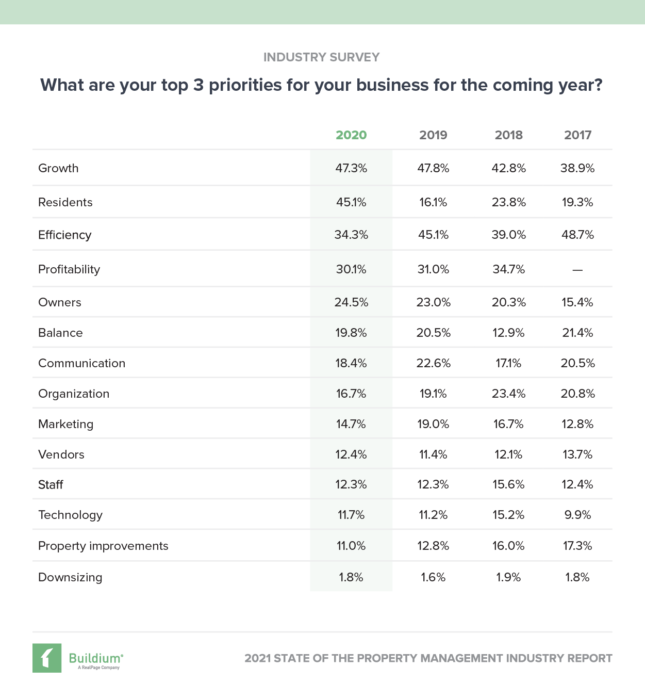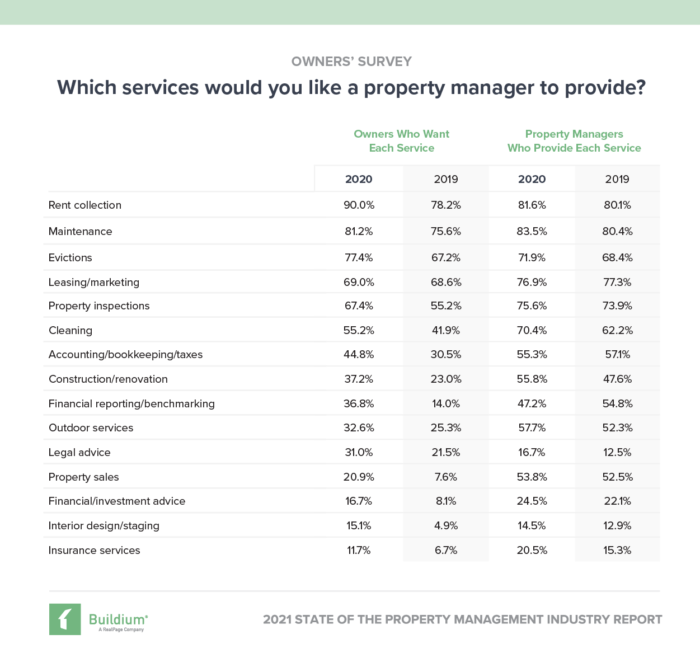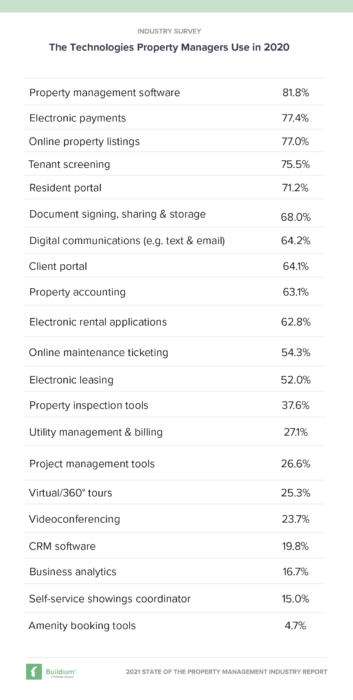Property managers have been on the front lines of every challenge that the rental market has faced in 2020. They’ve been stretched thin trying to prevent the spread of COVID-19 within their properties, while simultaneously trying to avert the damage that missed rent payments could have on the entire rental ecosystem. Many of the property management industry trends that have arisen this year are a direct reflection of the uncertainty that the pandemic has caused.
Chart of Accounts
Want clearer, cleaner books? What about a more useful view into your properties or just easier accounting in general?
Get the GuideBut in spite of these difficulties, property managers have told us that they’ve never felt more visible or more valuable in the work that they do—and they’re determined to stay on track with their growth goals in 2021, even if their strategies have had to shift in response to COVID-19.
So, how do we know this? Every year, Buildium surveys thousands of property managers, renters, and rental owners to provide invaluable intel and statistics in our State of the Property Management Industry Report.
In this article, we’ll dig into the results of those surveys to explore 4 property management industry trends that have emerged in 2020, and that we believe will determine the success of property managers’ businesses in 2021 and beyond.
#1: Property Managers Are Expending More Energy on Resident-Related Concerns
Once a year, we ask property managers what their priorities will be for the coming 12 months. The same 3 priorities—growth, efficiency, and profitability—have remained at the top for as long as we’ve been tracking this. But in 2020, 45% of property managers named ‘residents’ a top priority, beating out efficiency and profitability for the first time. This pushed ‘residents’ from ninth place on the list up to second place in 2020, while growth remained their primary goal for the year to come.

What we believe this shift reflects is a significant change in how property managers have been spending their time. This year, the most pressing pain points that property managers have faced have all revolved around renters and their homes—they’re trying to keep units full, rents paid, and residents safe.
Property managers have been communicating with renters more than ever, doing everything they can to reduce the strain on residents who are unemployed. In particular, they’ve worked hard to hammer out payment plans between renters and owners, with 60% of the property managers we surveyed reporting that they’d done this. Many property managers took things one step further, helping unemployed residents fill out financial aid forms, and sending them information on local aid resources. Renters told us how much they’ve appreciated property managers’ responsiveness during the crisis—particularly those that displayed great empathy and flexibility when renters came to them for help.
But at the same time, as rent payments have become less reliable, property managers have had to work hard to keep their clients’ properties above water.
#2: Owners Want More Communication, Services & Insights from Property Managers
Our survey found that 44% of property managers feel that their clients have viewed their services as more valuable during COVID-19. We believe this is the case for three reasons:
- Rental owners have a newfound appreciation for the expertise that property managers have in collecting rents every month, and their willingness to work out payment plans with struggling renters.
- As the regulatory landscape has gotten more complicated during COVID-19—with moratoria on evictions and late fees, as well as other local laws being passed to help keep renters in their homes—property managers’ expertise on legal matters is even more valuable than it was a year ago.
- The costs of running a rental property continue to go up; but because of the recession, the potential for rent growth has rapidly decreased. This means that rental owners need property managers’ help in maintaining their properties’ profitability more than ever now.
Last year’s Industry Report discussed the rising threat of investors trying to run their rental properties with apps, rather than with the expertise of a professional property manager; so this shift has given property managers a lot of hope for their businesses’ future, even as their job has become more complex.
As property owners have come to value property managers’ work more and more, it follows that they would want property managers to offer even more services. We found that the number of rental owners who want their property managers to provide any given service has increased by an average of 11 points since 2019.

The services that rental owners most want a property manager to provide in 2020 reflect the processes that have become increasingly taxing and complex during COVID-19—things like rent collection, maintenance, inspections, and leasing. This gives property managers a golden opportunity to expand their services, which many are already doing in an effort to outperform their competition and create new sources of revenue.
In addition, during COVID-19, property managers have been communicating with owners more frequently about incoming rent payments, vacancies, and regulatory changes. Many owners expressed a desire for this kind of communication to continue indefinitely; and they also want the ability to access financial reports on-demand, enabling them to know how their properties are doing without having to ask their property manager.
We believe these shifts are a sign of both the growing number of investors who are a part of property managers’ client base, in comparison with the Accidental Landlords they tended to serve in the past; as well as an increase in the number of property owners who view their rentals as an investment, and want to make sure they’re running profitably.
#3: Technology Will Remain Embedded in Property Managers’ Businesses After COVID-19
When the pandemic first hit, most property managers had to scramble to bring all of their processes online, finding ways to stay connected and get work done when meeting in person was suddenly not an option. Two-thirds of property managers told us that they’ve had at least one team member working remotely during the crisis, and many closed down their offices to visitors—some permanently. As you can imagine, this has caused new property management industry technology trends to emerge almost overnight.
At first, this seemed like an existential threat to an industry that prioritizes face-to-face connection. But ultimately, property management companies have seen the benefits of doing business digitally. Property managers largely agree that their teams are functioning just as well at home as they did in the office, with 72% reporting that their team’s morale, efficiency, and effectiveness have been the same or better while working remotely.
Many property managers already had the capability to offer online payments, communications, maintenance requests, and lease signing; so bringing their business fully online was less a matter of building a system from the ground up, and more a matter of connecting the dots. A quarter of property managers implemented a zero-touch leasing process in the last several months alone, combining classic capabilities like electronic lease signing with emerging technologies like 3D video tours.

What’s more: Property managers’ customers have responded positively to these changes. Prospective residents are loving the convenience of virtual tours and electronic leasing; and current residents appreciate being able to pay rent and communicate with their property manager by whichever means they prefer. Rental owners have liked getting more frequent updates on their properties; and they want self-serve financial reporting to allow them to stay up-to-date on their properties’ performance going forward.
With all of these stakeholders on board, it’s likely that many of these changes will become a permanent way of doing business. This industry that was once hesitant to move their operations online has suddenly entered a reality where technology is the connective tissue between property managers and the residents and clients whose trust they work so hard to win.
#4: Property Managers Are Finding Novel Ways to Grow in an Abnormal Environment
One of the biggest takeaways of the 2021 Industry Report is that property managers believe that COVID-19 has made the value of strategic, tech-embracing property managers clearer than ever. They believe that un-tech-savvy property managers and DIY landlords will get out of the business as regulations on the rental market increase, and profitability becomes more difficult to achieve. But for property managers who figure out the right balance of aggressive growth goals and empathy for their customers, they see an enormous opportunity to gain market share in the years to come.
The stat that best sums up property managers’ outlook at this point is this: More than three-quarters of property managers anticipate revenue and portfolio growth for their business in the next two years. This is true even with 9 months’ experience in the COVID-19 rental market under their belts—and in fact, their growth expectations improved by a couple of points between our May and August surveys.
More than three-quarters of property managers anticipate revenue and portfolio growth for their business in the next two years.
Though property managers have largely shifted their strategies to keep their business’ growth on track during this ongoing crisis, there has been a slight cooling in growth expectations in comparison with previous years. For the quarter of property managers who don’t plan to grow their portfolios over the next 2 years, the stability of rent payments is their main concern—they just don’t feel comfortable acquiring new properties until they know their rental income would be more stable. Once the future is a little more certain, we expect to see these numbers grow even more.
So, how are property managers growing their portfolios when some investors are hesitant to acquire new properties for the time being? They’re adopting creative strategies like reaching out to retiring property managers to acquire their portfolios, or sending out mailers to local rental owners who might be in need of property management services.
When it comes to revenue growth, property managers are paying more attention than ever to diversifying their sources of revenue and reducing their operating expenses as achieving profitability becomes more of a challenge. Some of their revenue growth strategies include making value-add updates to their rentals; getting licensed to buy and sell properties; and forming in-house maintenance and renovation teams.
Closing: 2021 Property Management Industry Trends
The events of 2020 have reshaped property managers’ business operations, communication patterns, use of technology, and outlook on growth. It’s also changed the way that property managers and their residents and clients relate to one another during a year that’s been incredibly challenging for just about everyone. But under normal circumstances, this constant change is something that property managers love about their jobs—knowing that every day is a new opportunity to outpace their own records and beat the competition. As a result, property managers will continue to do everything they can to stay on track with their goals and take care of their customers’ needs as they keep pushing through this uncertain time.
Interested in learning more about the trends that will drive the property management industry in 2021? Download your free copy of the 2021 Industry Report, which is full of insights on the market trends that explain what property managers are seeing in their own businesses; the changing preferences and expectations of their customers; and the strategies and technologies that have helped their peers find success in this unprecedented time.
Read more on Industry Research

